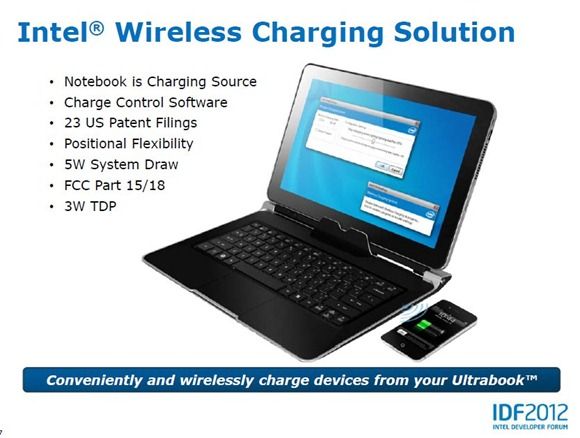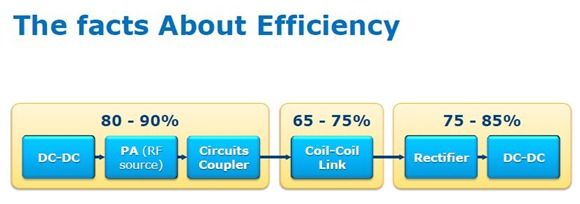I’m not a fan of wireless charging. I love the idea of cable-less operation but the inefficiencies far outweigh the advantages for me. Maybe I’m just too focused on mobile operation though because I agree, there’s a case for desk-top charging while working. Even though, wouldn’t it be easier to just have a separate charging mat?

When you charge your laptop you lose around 30% of the energy through AC-DC-DC-regulation conversions. That’s quite a chunk of energy. When you power your laptop from the battery you lose again in DC-DC conversion. 10% is a minimum. Charging a smartphone through an inductive loop from a battery is about the most inefficient method I can think of this side of solar energy. Not only are you going to lose over 50% of the energy going from one battery into another, you’ve also had to pay for the cost of the inductive charging mechanism and control circuitry. Considering nearly every smartphone can be charged via a USB cable and that every Laptop has a USB port with most Ultrabooks having Sleep ‘n Charge, do we really need this?

Wireless Charging was a theme at IDF in Beijing and I presented the solution in an article shortly afterwards and I see I also covered health and safety. I personally don’t get too worried about that but I can imaging more costs creeping in on the approval process.
I see why Intel is looking at it – offering compatible charging solutions on Ultrabooks, Tablets, Smartphones and Smart Watches provides a nice value-add and lock-in feature but the realities of it are that it’s a waste of energy.











Thanks for the write up.
I started wondering about the energy loss when I first heard about wireless charging. Ultrabook ties it in well as a logical usage scenario, but it is a pity to see the chain of inefficient processes that go to charge the wireless device… :(
I’d like to see the new USB spec implemented where it can provide up to 100 W of power. It’d be great to only have one power adapter that can charge my notebook, phone, batteries, etc or USB ports, when the notebook is on AC power, that can provide as much current my peripheral devices require.
Too bad wireless charging has the “cool” factor that a lot of people seem to care about. Then again, we are talking about ultrabooks…
I don’t see an huge impact of power usage on this for current Ultrabooks anyway. Even if you charge your phone from near zero to full, you are talking about only 5W.
You’ll take around 10Wh to charge a 5.5Wh phone battery. That’s 20-30% of an Ultrabook battery. Is it worth it?
Chippy.
You should never use wifi then Chippy, data loss chance is bigger than cable internet, thus more “inefficient”.
Wireless charging technology must be developed further until the efficiency can be so minimum. People should start using it whenever it’s available.
Producing cables is the same inefficient process because although every laptop has USB ports, every phone maker has their own port standard, so there must be a cable for each brand. Imagine if we don’t have to produce those cables, it’s much saving.
Pardon my english.
I am wondering how much efficiency could be gained by rewriting software to be energy efficient,
(I also do not like the idea of wireless charging due to the energy loss.)
Zoltan
Every single person that owns such a smart phone will need an iphone USB cable. Contrary to popular belief, this is necessary besides the regular dock station that you use. Most stations are only usable for charging the batter of the iphone and you will want to have a device that allows you to connect the phone to a USB plug. A universal dock that also includes a cable connect option is great but there are not many on the market. Most people will end up using USB cables. The problem is that there are too many options to not feel a little overwhelmed. ^
Our webpage
<,http://www.healthmedicinecentral.com/mucus-in-lungs/